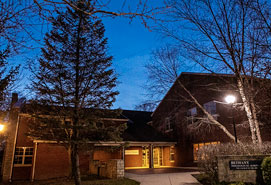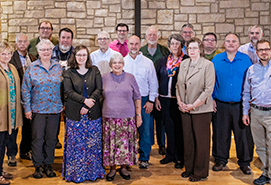Finding Ways to Thrive

For Matthew Fike, MDiv 1999, this sort of shared vision is the key to a thriving church. Too many congregations, and even pastors, operate from the assumption that it is up to the pastor to set the vision for a church.
“The turning point for me was realizing that it’s not up to me to figure it all out. It’s up to God,” Fike reminds us. “God will set the vision, then the congregation needs to listen faithfully to the direction into which they are being called.”
At Mountain View Fellowship, that has meant a focus on welcoming families with young children. The fellowship was founded about 25 years ago, in McGaheysville — a village outside Harrisonburg, Virginia. that was not served by other Brethren churches. The area is now growing quickly with several new subdivisions built within a mile of the church. The congregation focuses on outreach to families through activities like an Easter egg hunt, vacation bible school, and community picnics. As a result, young families account for much of the growth in the church, and only about 20 percent of the congregation grew up in the Church of the Brethren.
“The draw to Mountain View is that we are a vital congregation that focuses on the younger crowd, and that resonates with Anabaptist witness, peace witness, and outreach,” says Fike. “When they get here and understand the beliefs of the Church of the Brethren, they stay, and our witness resonates.”
Fike believes that if congregations keep open minds and hearts, they can draw on the resources that they have to grow and thrive. In terms of pastoral ministry, that includes looking within their own communities for those with the gifts and graces of ministry.
“I think it’s time to return to the old model of congregations growing their own pastors,” he says. “It used to be that congregations knew it was up to them to identify individuals with pastoral gifts and then support them as they sought the training that they need.” Fike points out that in recent decades, there have been district-level efforts to recruit future clergy through “Calling the Called” programs. As a member of his own district ministry team, however, he believes that these efforts were not a good replacement for churches’ local efforts to lift up ministers from within a church community. And once individuals respond to a call, Fike offers this advice.
“Pastors need to love the congregation for who they are and build trust. Try to understand the ministry that has happened. Then you need to find out, through prayer and bible study, what direction God is leading the church.”








 Green Circle: Bethany invests in 100% renewable energy.
Green Circle: Bethany invests in 100% renewable energy.